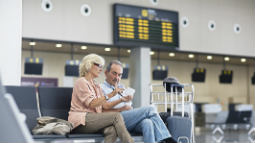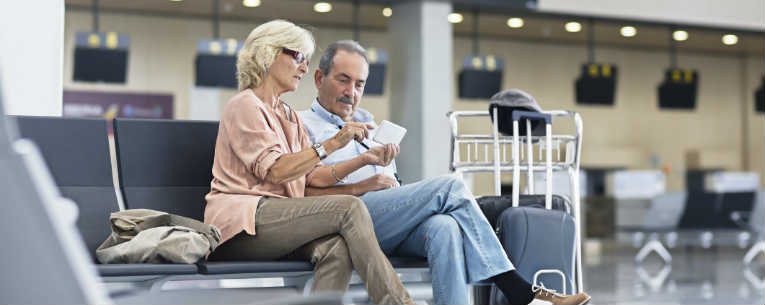Those who truly love travel never lose that passion. But as we age, the challenges and inconveniences of travel —long security lines, enormous airports, flight delays — sometimes overshadow its joy
With a little advance planning, however, senior travelers can make air travel easier. Here’s how
Before You Travel: Tips for Senior Travelers
Pack prescriptions and other essential items in your carryon. When you’re packing, be a pessimist! Assume your checked bag will be delayed. Then ask yourself: What can I absolutely not live without on this trip? Prescription meds, hearing aid batteries, reading glasses and a change of clothes are must-haves for many senior travelers.
Ask for special accommodations when you’re buying your ticket. The more advance notice an airline has, the better the chances they’ll be able to provide what you need. For that reason, don’t wait to ask for things like extra legroom, expedited boarding, or wheelchair airport assistance.i Call the airline, or put in an online request, as soon as you book the flight.
Don’t hesitate to be your own advocate. If you have hearing loss, for instance, explain to the gate agent or other personnel that you need them to speak slowly and distinctly and that you may not hear gate announcements.ii
Get a doctor’s note describing your conditions and needs. Just in case a verbal explanation’s not enough, it can be helpful to carry a letter from your physician that outlines, in brief, the conditions or disabilities you have and any special accommodations you require. Don’t expect the note to get you a free seat upgrade, however.iii
Get travel insurance. Travel insurance is absolutely essential for older travelers. Travel delay benefits can reimburse the unused part of your prepaid expenses, minus any refund you receive, and reimburse reasonable expenses for meals, accommodation and transportation if your trip is delayed six or more hours for a covered reason. Beyond the airport, you need emergency medical and dental benefits and emergency medical transportation benefits, both of which can be invaluable if you should suffer a serious covered illness or injury overseas.
See all travel insurance options from Allianz Partners
Call the TSA Cares Helpline. The Transportation Security Administration urges passengers to call its helpline — 1-855-787-2227 — if they have specific questions about screening, or if they need special assistance at the security checkpoint. Call at least 72 hours ahead of your flight, if possible.
Sign up for TSA Pre✓. TSA Precheck allows you to go through expedited security, once approved. A membership costs $85 for five years. Precheck is especially helpful for senior citizens; if you have a medical device, medical condition or a disability, then you don’t need to remove shoes, laptops, 3-1-1 liquids, belts, or light jackets during the screening process.iv Apply for Precheck here.
Airport Security Tips for Senior Travelers
Print a TSA Notification Card. If you have disabilities or any condition that makes it difficult to go through security, an easy and discreet way to communicate that is a TSA Notification Card. Carry the card with you and present it to the TSA officer before screening. Here’s a template you can print.
Ask for expedited screening if you’re 75 or older. TSA rules for seniors are slightly relaxed: You may leave on your shoes and light jacket during security screening. If the alarm goes off, however, you may have to take off your shoes or be patted down.v
Request a Passenger Support Specialist. These are TSA officers who are specially trained to assist and screen individuals who have disabilities or medical conditions, or who travel with medical devices. You can ask for a Passenger Support Specialist when you enter security, or call the TSA Cares line to ask for one ahead of time.
Check if your medical device can be safely screened. If you have a neurostimulator, port, insulin pump, ostomy or other medical device attached to your body, let TSA personnel know about it. If your device can be safely disconnected and X-rayed, they may want to scan it.vi If not, they’ll conduct a visual screening. “We’re not going to ask you to remove your clothes. We will basically ask you to put some pressure on your device with your own hands, and then we’ll screen and swab your hands for any traces of explosives,” TSA spokesperson Lisa Farbstein explained to WTOP.vii
If you have a portable infusion pump, such as an insulin pump or glucose monitor, you won’t have to remove it.viii You’re not required to remove hearing aids when you go through airport security, either — and you shouldn’t, because putting them through the X-ray may damage the microphones, the AARP reports.ix
Ask for a private screening, if you’d prefer one. A travel companion can come with you to a private screening area, if you have a medical device or disability that may complicate the security screening.
Be extra careful with what you pack in your carryon. The TSA’s list of prohibited items is long, and if you mistakenly pack something that’s forbidden, it could delay your screening (or even get you in legal trouble.)
Related Articles








Share this Page